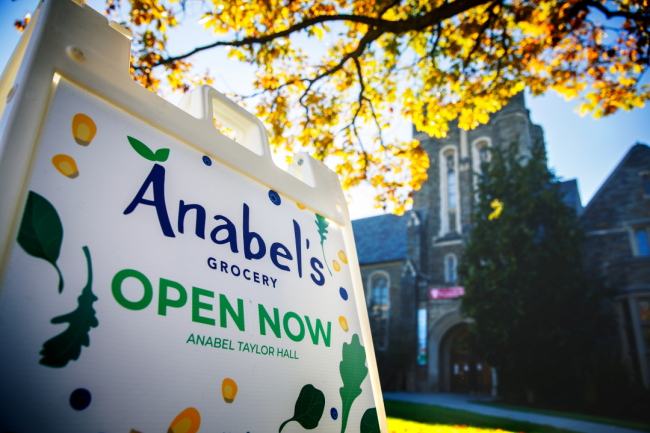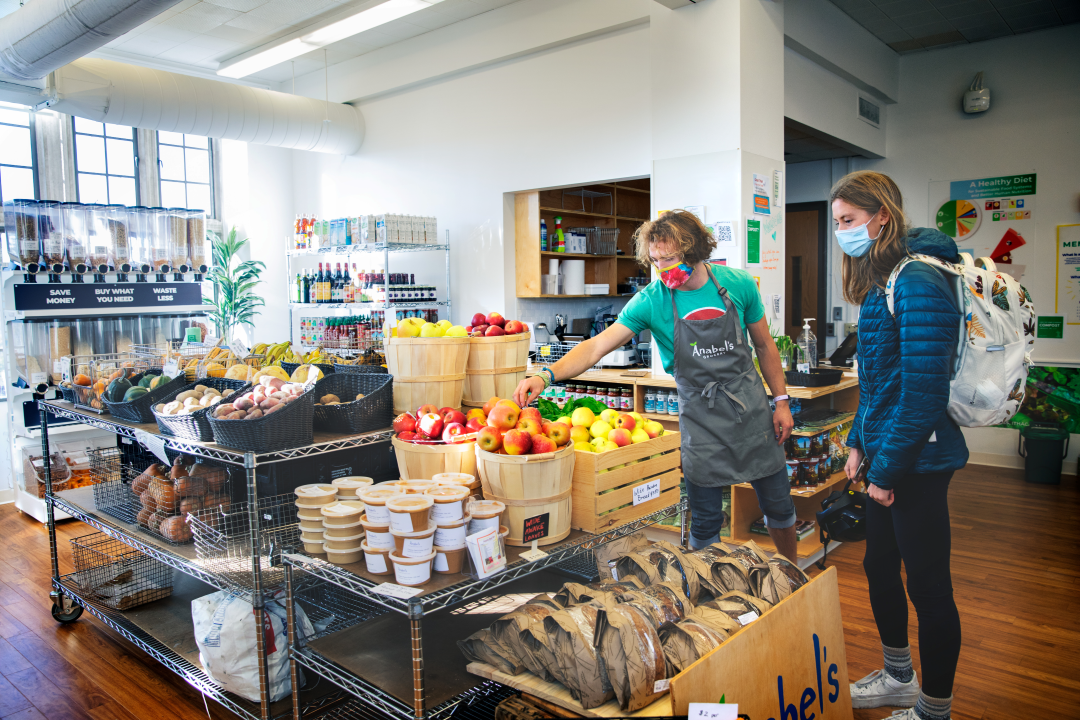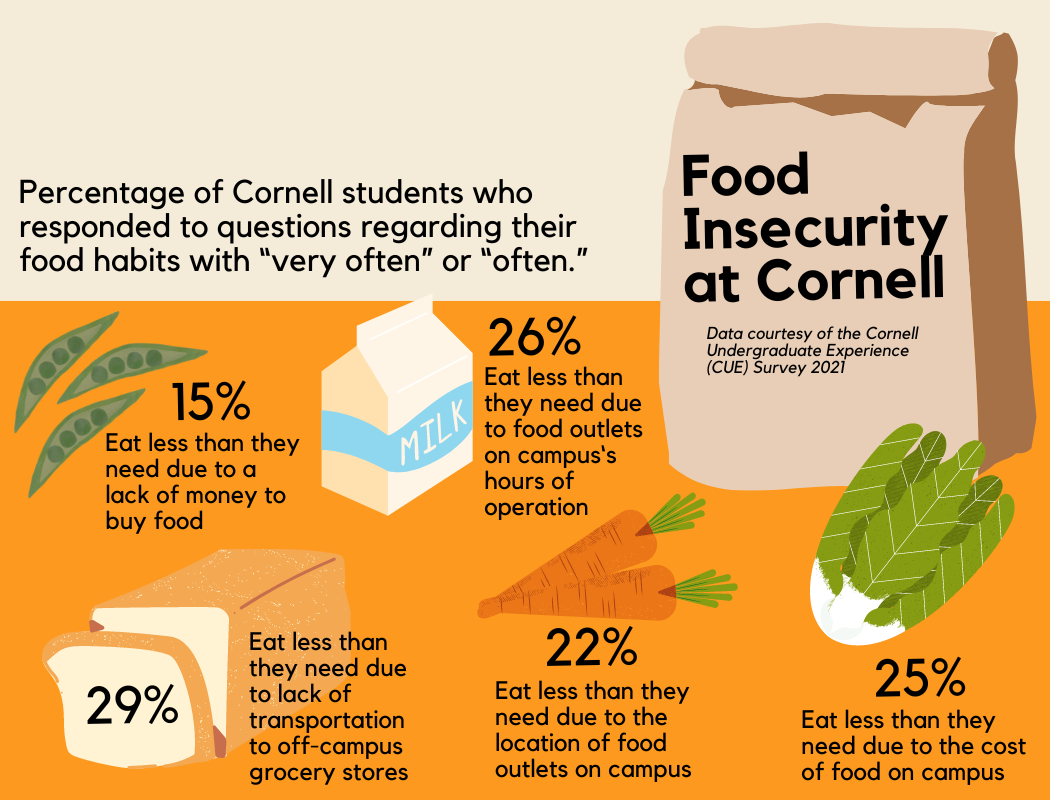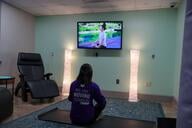You have /5 articles left.
Sign up for a free account or log in.

A student-run grocery store on Cornell University’s campus provides below-market rates on fresh, healthy produce for community members.
Jason Koski/Cornell University
Cornell University’s student-run grocery store is not the average learning lab, but instead an act of social justice, a basic needs provider and an on-campus community.
Nonprofit Anabel’s Grocery provides fresh, affordable groceries for the Cornell community and an experiential learning environment for business and environmental studies students each semester.
What is it: Anabel’s Grocery is a project of the Center for Transformative Action, a nonprofit that sponsors social entrepreneurship at Cornell.
The storefront opened in 2017 to provide affordable, high-quality food without the stigma around a food assistance program or a campus food pantry. Anabel’s also targets student needs around learning to prepare nutritious meals with cooking courses, recipes and cookware for rental.
Anabel’s Grocery closed in 2019 for a restructuring and stayed closed during remote instruction, finally reopening for in-person shopping in March 2021.
The store offers produce, grains, frozen fruits and vegetables, legumes, spices, snacks, canned good, eggs, and dairy products. Anabel’s also offers a membership program, in which members can provide direct feedback on stock items, receive invites to community dinners and gain insider information for upcoming events.
Beyond providing nutritious foods, Anabel’s Grocery staff provide educational programming on meal preparation, food insecurity and climate change.
The grocery store is student-run, with the exception of help from a faculty adviser and from the accounting department at Cornell, says Dylan Rodgers, an Anabel’s Grocery volunteer and Cornell senior.
The store is open Wednesday through Friday from noon to 7 p.m. and Saturday from noon to 3 p.m., and students staff it for all open hours and after hours to restock and do basic maintenance, Rodgers says.
Since reopening in 2021, Annabel’s has seen sales double semester over semester, Rodgers says. This semester, the growth is leveling out as the grocery reaches capacity in its scope as a student organization, but consumption remains well above 2019 levels.
Experiential learning: Anabel’s Grocery is part of a class, the Social Entrepreneurship Practicum, taught by Anke Wessels, a management and organizations lecturer and the director of CTA. Students receive credit with the course and afterward can take a paid position or volunteer.
Students typically participate in the store first as part of the course requirements, as part of one of five committees: people and operations; purchasing; sales and product promotion; marketing, collaboration and education; and fundraising and finances.
“After you’ve taken the class, people will just stay on,” Rodgers explains. “Now it’s up to, like, 10 student coordinators … The class has grown a lot bigger, but has definitely maintained the same sort of community feel.”

Jason Koski, Cornell University
Rodgers opted in to the course after completing a sustainable agriculture course and learning about the ways food can mitigate climate change and increase community health, justice and equality as an applied solution on campus.
“[Food security] is a very root system that touches everybody every single day—like, every few hours. We all need to eat, and so that is a place to bring people together and unite the common causes,” Rodgers says.
In his first semester, Rodgers served on the purchasing team but transitioned to collaboration and education and now oversees collaboration with outside groups, like the student organization Basic Needs Coalition.
Student involvement is an undercurrent in most of the store’s operations. Anabel’s Grocery is also stocked with student-grown produce from the student-run organic farm on campus and the hydroponics club.
Beyond the applied skills learning, Rodgers has gained a community among the student workers as well as insight into his future career pursuits.
“It is a great learning lab,” Rodgers says. “I met my best friends there, and I think we align on such a values level. That’s been a really positive experience throughout my time at Cornell and helped me, and I think everybody else, learn a lot about what they would want to do later in life.”

Ashley Mowreader | Inside Higher Ed
Basic needs at Cornell: The store’s location on campus, in Anabel Taylor Hall and next to the Durland Alternatives Library, removes a transportation barrier to food access.
All students can use the grocery store, including graduate and continuing education students, and there is no demonstration of need required.
The food is also subsidized by undergraduate and graduate student assemblies, allowing for at- or below-market prices, which the store compares against the Ithaca Wegmans.
Annabel’s isn’t an official basic needs resource; Cornell also offers a free, confidential food pantry on campus for students, staff and faculty members. The store does, however, function as part of the solution toward food insecurity, Rodgers says.
“Just making sure that we’re open at the right times and at a good price point for the vast majority of students to be able to use this as a resource to—I wouldn’t say solves food security by any means—but supplements the ongoing efforts of the university and the community and other student groups,” he adds.
Seeking stories from campus leaders, faculty members and staff for our Student Success focus. Share here.




